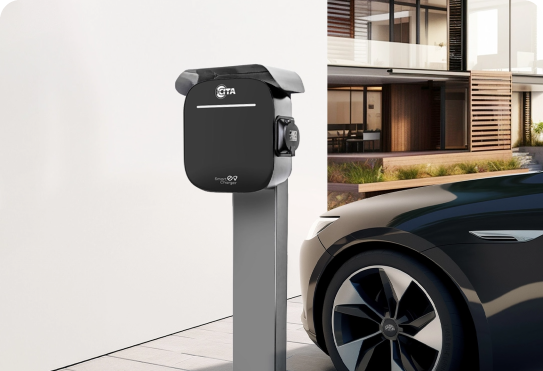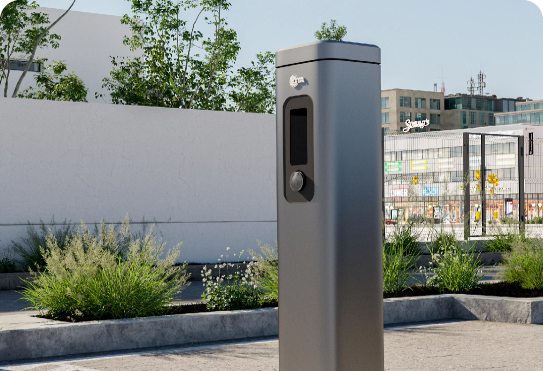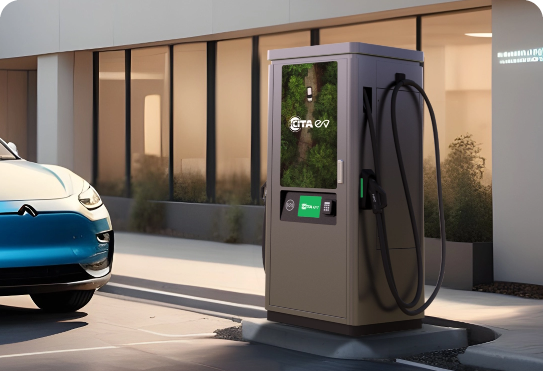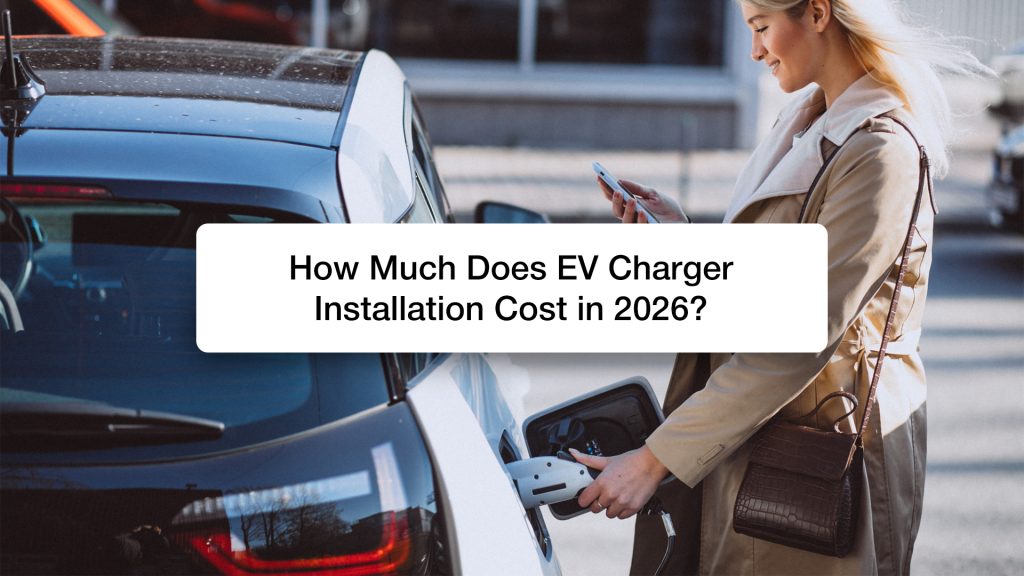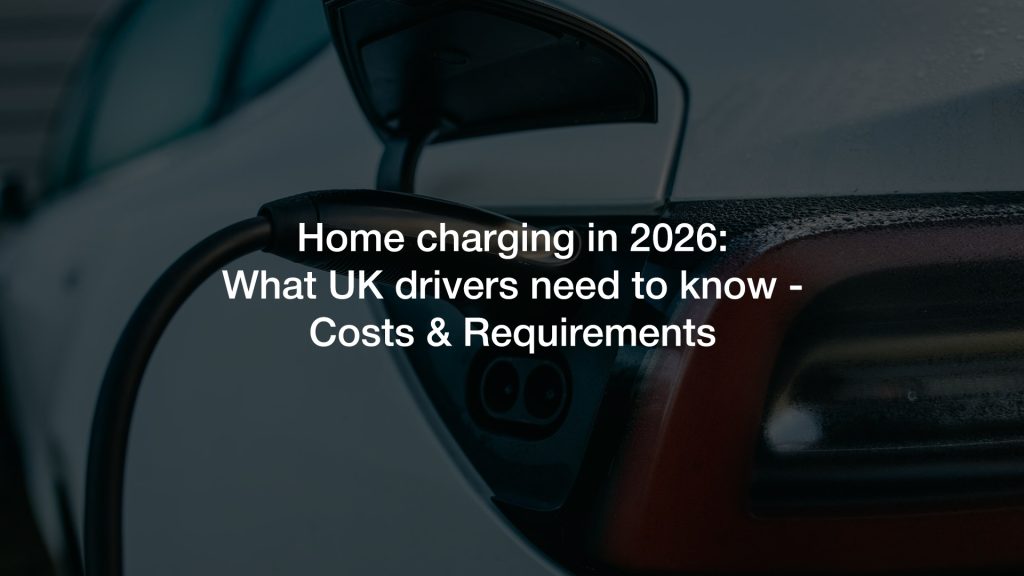Smart EV Charging is revolutionizing the UK as the nation races toward its ambitious 2030 ban on new petrol and diesel vehicle sales, with the electric vehicle revolution already transforming Britain’s roads. With over 950,000 fully electric vehicles now traversing the country and a remarkable 40% year-on-year growth in EV registrations, the question isn’t if but how quickly the transition will happen. Yet this rapid adoption presents a formidable challenge: the UK’s electrical grid—designed for a pre-digital age—must now accommodate millions of vehicles potentially plugging in simultaneously after the evening commute, creating demand spikes that could overwhelm the system.
Enter smart EV charging – the technological breakthrough that’s not merely addressing this challenge but turning it into an unprecedented opportunity. Unlike conventional EV chargers, smart systems communicate with both vehicles and the national grid, optimising charging times, controlling costs, and balancing energy demands. For British drivers, this translates to significant savings—charging at 7.5p per kWh during off-peak hours rather than 34p during peak times, potentially saving £600 annually. Beyond individual benefits, these systems are reshaping Britain’s energy ecosystem, with over 45,000 vehicles in demand-response programmes helping National Grid avoid potential brownouts during the winter of 2023 while earning their owners additional income. As we explore this innovative technology, we’ll discover how smart charging is accelerating the UK’s journey toward net-zero emissions while creating a more resilient, efficient, and economical transport sector for all Britons.
Leading this transition is CITA EV, a company dedicated to innovation, environmental responsibility, and technological progress. Through its cutting-edge EV charging solutions, CITA EV is helping shape the future of human mobility by providing reliable and efficient EV charger options for individuals and businesses alike.
The Rise of Smart EV Charging in the UK

Record Growth in Smart Charging Infrastructure
Smart EV chargers in the UK now offer sophisticated features that weren’t available even 18 months ago: automated time-of-use tariff optimization, solar integration, and vehicle-to-grid (V2G) capabilities. Data from the Department for Transport reveals that smart chargers with V2G technology have helped participating households reduce their electricity bills by an average of 28% compared to homes with standard EV chargers.
Beyond Home Charging: Workplace and Retail Solutions
UK workplaces have installed over 17,500 smart chargers, with companies reporting a 34% increase in EV adoption among employees with access to workplace charging. Major supermarket chains like Tesco, Sainsbury’s, and Waitrose now offer smart EV charging at over 1,200 locations nationwide, bringing solutions to suburban and rural areas where EV charging points were previously scarce.
Financial Incentives for UK Consumers
The Electric Vehicle Infrastructure Grant provides up to £350 toward smart EV charger installation costs. Energy suppliers offer specialized tariffs that can reduce charging costs by up to 70% compared to standard rates, with companies like Octopus Energy introducing rates as low as 5p per kWh during overnight hours. These smart charging-compatible tariffs have saved British EV owners an estimated £127 million in charging costs over the past year.
Environmental Impact
National Grid ESO reports that smart EV charging has already prevented an estimated 1.2 million tonnes of CO2 emissions by optimizing charging during periods of high renewable energy generation. During particularly windy nights in January 2024, smart charging systems directed over 68% of all EV charging to occur during renewable energy peaks, effectively turning thousands of vehicles into mobile energy storage units for clean electricity.
Smart EV Charging: Government Policies and Incentives

The Smart Charging Regulations
The UK government has implemented mandatory smart charging regulations that came into effect in June 2022, requiring all new home and workplace EV chargers to include smart functionality. These regulations ensure that chargers can communicate with the grid and optimize charging times automatically. All smart EV chargers must now include default off-peak charging settings and the ability to delay charging during peak demand periods, making the UK a global leader in standardizing smart charging technology.
The OZEV Grant Scheme
The Office for Zero Emission Vehicles (OZEV) has been instrumental in accelerating smart EV charging adoption through its comprehensive grant programs. OZEV administers the Electric Vehicle Homecharge Scheme and the Workplace Charging Scheme, providing crucial financial support for smart charger installations. Additionally, OZEV’s technical standards require that all funded chargers meet stringent smart charging criteria, including remote accessibility, energy monitoring, and grid communication capabilities. Since its inception, OZEV has facilitated over £400 million in funding across its various schemes, making it the cornerstone of the UK’s EV charging infrastructure development.
Electric Vehicle Homecharge Scheme (EVHS)
The Electric Vehicle Infrastructure Grant (formerly the EVHS) offers UK homeowners up to £350 toward smart EV charger installation costs. This grant has supported over 230,000 domestic installations to date, with a specific requirement that all funded chargers must include smart capabilities. For households without off-street parking, the government has increased funding to the On-Street Residential Chargepoint Scheme to £20 million annually, prioritizing smart charging infrastructure in residential areas.
Workplace Charging Scheme (WCS)
UK businesses can access up to £15,000 in vouchers through the Workplace Charging Scheme to install smart EV charging points on their premises. Companies can claim up to 75% of installation costs (capped at £350 per socket) for up to 40 charging points. This initiative has been particularly successful in encouraging employee EV adoption, with participating businesses reporting a 34% increase in electric vehicle purchases among their workforce.
Local Authority Support
Local councils across the UK have received £450 million in dedicated funding for smart EV charging networks through the Local Electric Vehicle Infrastructure (LEVI) Fund. This has enabled innovative projects like Milton Keynes’ smart lamp post chargers and Glasgow’s renewable-powered charging hubs. By October 2024, this funding had supported the installation of over 8,500 public smart charging points in previously underserved communities.
Smart Charging Innovation Competition
The Department for Transport has launched a £16 million Smart Charging Innovation Competition to accelerate the development of next-generation smart EV charging technologies. This initiative funds companies developing advanced load-balancing algorithms enhanced V2G capabilities, and artificial intelligence systems that can predict and respond to grid demands. Recent winners include companies developing AI charging systems that have demonstrated the ability to reduce peak grid demand by up to 40%.
Resolving Issues with Electric Vehicle Charging Stations

Common Smart EV Charger Problems and Solutions
Smart EV charging technology, while advanced, occasionally experiences issues that can frustrate users. The most frequently reported problem with UK charging points is connectivity failures, accounting for approximately 24% of all service calls. When your smart EV charger loses connection, a simple power cycle (turning it off for 30 seconds before restarting) resolves the issue in over 70% of cases. For persistent connectivity problems, check your home Wi-Fi signal strength or consider installing a Wi-Fi extender, as smart chargers require stable internet to communicate with both the grid and your smartphone app.
Troubleshooting Charging Interruptions
Unexpected charging interruptions affect approximately 18% of UK EV owners each year. These often stem from load management features activating during peak demand periods. To minimize interruptions, configure your smart EV charger to prioritize charging during off-peak hours (typically between 12am-5 am) when both electricity rates and grid demand are lowest. Many UK-specific charging apps now offer “guaranteed charge” settings that ensure your vehicle reaches a minimum battery percentage regardless of demand response events.
Maintenance and Weather Considerations
The British climate presents unique challenges for EV charging infrastructure. During the winter months, charging efficiency can drop by up to 15% due to battery chemistry limitations in cold temperatures. Quality smart EV chargers designed for UK weather include weatherproofing to IP65 standards or higher, protecting against the nation’s frequent rain. Schedule annual maintenance checks for outdoor chargers, particularly after extreme weather events. Most reputable EV charger installation companies throughout the UK offer maintenance packages that include cable inspection, connection tightening, and software updates.
Navigating Public Charging Network Issues
When using public smart EV charging points across the UK, payment system failures represent the most common complaint. Always carry at least two different payment methods (typically credit cards and charging network apps). For emergencies, the CITA EV app provides real-time status updates for nearly all UK public charging stations, helping you locate nearby alternatives when a station is malfunctioning. The National Chargepoint Registry has also implemented a standardized error code system, making it easier to report and resolve issues with specific EV charging points.
When to Seek Professional Assistance
While many smart EV charger issues can be resolved through basic troubleshooting, certain problems require professional intervention. Contact a qualified EV charger installation specialist if you experience repeated circuit breaker trips, burning smells, visible damage to cables, or error codes related to ground fault detection. All smart EV chargers installed in the UK should come with dedicated technical support, typically available 24/7. For enhanced consumer protection, chargers that meet the Electric Vehicle Consumer Code for Home Chargepoints (EVCC) standards offer guaranteed response times for critical issues, typically within 24 hours.
Future Growth Potential
Locations in areas with projected high EV growth rates and planned development show stronger long-term financial performance. Analysis of local authority planning data, demographic trends, and EV adoption forecasts can identify areas poised for significant growth in charging demand.
Pick the Appropriate Charger for Your EV
When selecting a home EV charger, understanding the different types and charging levels is essential for making an informed decision. Each EV charger solution delivers power to your vehicle’s battery, and each one impacts your daily charging experience.
Level 1 charger
Starting with Level 1 charging—the most fundamental approach accessible to owners of electric cars—let’s With your normal UK household outlet (230V), this method generates roughly 2.3-3 kW of power. Although every electric car comes with a Level 1 charging cable, which makes it appear like a handy choice, its restrictions show themselves in daily use. A standard 60kWh battery adds only 8–10 miles of range per hour and takes 15–20 hours to completely charge. Level 1 Smart EV charging is best suited for emergency backup rather than daily use even if it uses existing home electrical outlets and calls for no professional installation.
Level 2 charger
Advancing up to Level 2 charging brings the top home EV charger manufacturers in the UK, thought to be the ideal solution for household use. Two main types of these chargers are upgraded 11-22kW units and basic 7kW models. For most UK households, the conventional 7kW option is the sweet spot; it charges a normal 60kWh battery in 8–10 hours and adds almost 25–30 miles of range every hour. Using the single-phase power typical of UK homes, this makes it ideal for overnight charging. Although they call for three-phase power installation, the improved 11-22 kW models can cut charging times to 3-6 hours and prove perfect for homes with several electric vehicles.
Trusted Home EV charger producers in the UK provide modern Level 2 chargers with advanced capabilities outside of simple charging. Among these are remote monitoring via smartphone apps, integration with residential solar systems, and smart charging features that maximize energy economy. Certified under UK standards by IP65 and IK10 Rated Home EV Charger, weather resistance guarantees dependable functioning under all conditions. Level 2 chargers are the most sensible option for home installation because of these qualities together with load balancing ability to control household power usage.
Level 3 charger
Although DC fast chargers, or Level 3 chargers, are not fit for home installation, they are somewhat prevalent as appropriate commercial chargers. Capable of charging a battery to 80% in just 20 to 60 minutes, this commercial-grade solution provides charging rates from 50 kW to 360 kW. But it mostly serves public and commercial charging stations and calls for specific electrical infrastructure. Knowing this alternative helps us to realise why Level 2 charging offers the best balance for residential use.
How do you Know Which Electric Vehicle Charger is Right for your Home?

Assess Your Home's Electrical Capacity
Before selecting a smart EV charger for your UK home, evaluate your property’s electrical infrastructure. Most British homes have either a 60A or 100A main fuse, which determines the maximum power available for all appliances. A standard 7kW smart EV charger requires a 32A supply, which can be accommodated by most UK domestic electrical setups. However, if you’re considering faster charging (such as 22kW), you’ll likely need a three-phase supply—something only about 15% of UK homes currently have. Arrange for a qualified electrician to assess your consumer unit and advise on any necessary upgrades before purchasing your smart EV charger.
Consider Your Daily Driving Requirements
Your typical driving habits should influence your choice of smart EV charger. For the average UK driver covering approximately 20 miles daily, even the most basic 3.6kW charger will sufficiently replenish your vehicle overnight. However, if you regularly undertake longer journeys or have a vehicle with a larger battery capacity (like the 77kWh Volkswagen ID.4 or 100kWh Tesla Model S), a 7kW smart charger would be more appropriate, reducing charging times by nearly 50% compared to slower alternatives. Consider that most UK EV owners charge their vehicles 2-3 times per week rather than daily.
Smart Features That Matter for UK Users
Not all smart EV chargers offer the same functionality, particularly in the context of the UK energy market. Look for chargers with dynamic load balancing that can automatically adjust charging rates based on other household electricity usage—a crucial feature for UK homes with limited electrical capacity. Solar integration capabilities are increasingly valuable, allowing your charger to automatically increase charging rates when your solar panels are generating excess power. Also prioritize chargers compatible with UK-specific time-of-use tariffs like Octopus Intelligent or EDF GoElectric, which can reduce charging costs by up to 70% by automatically scheduling charging during off-peak hours.
Installation Requirements and Costs
With EV technology evolving rapidly, selecting a future-proof smart charger is essential. Look for models that receive regular over-the-air software updates and support open communication protocols like OCPP (Open Charge Point Protocol), which ensures compatibility with different vehicles and energy management systems. Vehicle-to-grid (V2G) and vehicle-to-home (V2H) capabilities are becoming increasingly important in the UK market, allowing your car to act as a power source during peak times or outages. Though these technologies command a premium (typically £300-£500 more than standard smart chargers), they offer long-term value as the UK grid continues its transition toward renewable energy reliance.
How CITA EV Charger Is Driving the Smart EV Charging Revolution in the UK

The UK's Premier Smart EV Charging Manufacturer
CITA EV Charger has firmly established itself as the leading EV charger manufacturer in the UK, delivering innovative smart EV charging solutions for both home and commercial applications. With its comprehensive range of UKCA and CE-certified chargers, CITA has positioned itself at the forefront of the smart EV charging revolution sweeping across Britain. Their commitment to quality and innovation has earned them OZEV approval, ensuring customers can access valuable government grants when installing CITA’s smart charging systems.
Diverse Product Portfolio Meeting Every Charging Need
CITA offers an impressive range of smart EV chargers tailored to different requirements across the UK market. Their AC charging solutions include powerful 7kW, 11kW, and 22kW options that cater to various vehicle types and electrical setups. For locations requiring multiple charging points, CITA’s innovative 44kW Dual AC EV Chargers enable simultaneous charging of two vehicles—ideal for multi-vehicle households or small business fleets. Where rapid charging is essential, CITA delivers cutting-edge DC charging technology with capacities ranging from 60kW to an impressive 360kW, making them suitable for everything from small commercial deployments to major charging hubs along Britain’s motorway network.
Built for British Weather and Conditions
Understanding the challenging UK climate, CITA has engineered their AC chargers to IP65 and IK10 ratings, ensuring complete protection against dust ingress and water jets from any direction while offering exceptional impact resistance. Their DC charging range maintains similar durability with IP54/IP55 and IK10 ratings, guaranteeing reliable performance across Britain’s diverse weather conditions—from coastal salt spray to urban pollution. This robust construction has made CITA chargers particularly popular in exposed locations throughout Scotland and Northern England, where lesser chargers often fail during severe weather events.
Intelligent Software Ecosystem
CITA’s smart charging capabilities extend beyond hardware excellence through their sophisticated software ecosystem. The CITA EV App provides users with comprehensive control over their charging experience, enabling schedule optimization, consumption monitoring, and synchronization with UK-specific time-of-use tariffs. For commercial operators, the CITA Charge Point Management System delivers powerful fleet management tools, detailed analytics, and seamless payment processing. This integrated approach has enabled many UK businesses to reduce fleet charging costs by up to 43% while simultaneously supporting their corporate sustainability goals.
Global Reach with UK-Focused Support
While CITA has expanded operations to over 35 countries worldwide, they maintain a steadfast commitment to their UK customer base. Their exceptional service has earned them an impressive 4.8-star rating and built a community of more than 1,000 satisfied customers across Britain. CITA’s 24/7 customer support team specializes in addressing UK-specific charging challenges, while their nationwide installation network ensures professional setup regardless of location. This customer-centric approach extends to their warranty offerings, with AC chargers backed by a 3-year warranty (extendable for additional peace of mind) and DC systems covered for 2 years with extension options available.
Hassle-Free Installation and Ownership Experience
CITA has revolutionized the smart charging installation process in the UK market with its comprehensive support system. Their flexible mounting options accommodate the diverse architectural styles found across Britain, from Victorian terraces to modern apartments. The chargers’ compact design addresses space constraints common in UK properties, while professional installation support ensures compliance with British electrical standards. This attention to detail has made CITA the preferred choice for many first-time EV owners making the transition to electrified transport, providing them with reliable smart charging technology backed by expertise and ongoing support.
Where Smart Electric Vehicle Charging Is Headed in the UK

With clever EV charging at the foundation of this change, the UK is fast moving towards a cleaner and more efficient transportation industry. Adoption of electric vehicles increases calls for creative and easily available EV charger solutions more than before.
Leading this revolution is CITA EV Charger, which provides modern EV charger installation ideas meant for household and business use. Emphasising smart technology, dependability, and sustainability, CITA EV Charger guarantees that electric vehicle charging in the UK is more reasonably priced, convenient, and generally accessible. From fast EV recharge sites to sophisticated EV charger portable choices, CITA is enabling the infrastructure supporting the electric revolution.
The UK is opening the path for a future driven by smart EV charging with government incentives, technological breakthroughs, and a dedication to lower carbon emissions. Investing in smart charging solutions now can help people and companies create a more sustainable transportation environment for the next generation.




